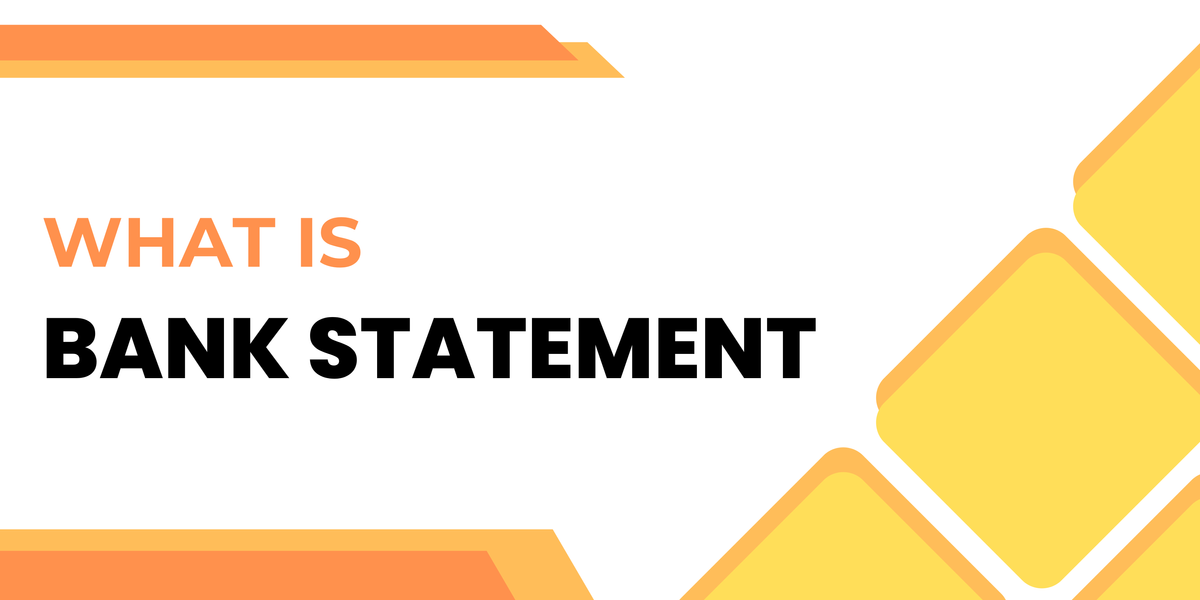A bank statement isn’t just a list of transactions—it’s your financial roadmap.
It captures every detail of your account activity, giving you a clear view of your spending, income, and overall financial habits. From tracking expenses to verifying balances, it’s an essential tool for staying in control of your money.
Knowing what a bank statement is, why it’s important, and how to use it effectively can help you stay financially organized, catch potential issues early, and make smarter decisions.
This guide simplifies the essentials so you can make the most of this valuable financial resource.
What is a Bank Statement?
A bank statement is a monthly summary of your account activity provided by your bank or financial institution. It details all transactions, including deposits, withdrawals, purchases, and fees, giving you a clear record of your financial activity.
Bank statements are essential for:
- Tracking and Verifying Transactions: Ensuring all activity is accurate and authorized.
- Budgeting and Financial Planning: Analyzing spending habits and income to create effective budgets.
- Tax Preparation and Loan Applications: Providing proof of income and expenses.
- Legal and Compliance Needs: Serving as evidence in audits or disputes.
In short, a bank statement is your financial snapshot, helping you stay organized, plan ahead, and manage your money confidently.
Pro Tip: Easily convert your PDF bank statements to Excel or CSV formats with Convert My Bank Statement.
Types of Bank Statements
Bank statements come in various formats and are tailored to meet different needs. Here’s an overview of the common types:
1. Personal Bank Statements
These statements are issued to individual account holders and detail personal financial activity. They include transactions such as deposits, withdrawals, bill payments, and card purchases, helping individuals manage their day-to-day finances.
2. Business Bank Statements
Designed for business accounts, these statements provide an overview of financial activity related to business operations.
They often include detailed breakdowns of incoming payments, outgoing expenses, payroll transactions, and other business-specific activities. This makes them vital for financial management and audits.
3. Printed Bank Statements
Traditional printed bank statements are mailed directly to account holders. While less common today, they’re still used by those who prefer a physical record of their finances.
Printed statements are useful for filing, record-keeping, or when a hard copy is required for legal or formal purposes.
4. Digital Bank Statements
With the rise of online banking, digital statements have become the standard. Accessible via bank websites or mobile apps, they offer convenience, instant access, and eco-friendliness. Digital formats like PDFs are easy to download, share, and integrate with financial management tools.
Key Information in a Bank Statement
A bank statement contains essential details that provide a complete picture of your financial activity. Here’s a breakdown of the key elements:
1. Account Information
Primarily your bank account will show you some key information such as:
- Account Holder’s Name: Identifies the owner of the account.
- Account Number: A unique identifier for the specific bank account.
- Bank Details: Includes the name and contact information of the issuing bank.
2. Transaction History
Bank statements majorly contain different types of transactions such us:
- List of Transactions: A chronological record of all account activity during the statement period.
- Transaction Types: Categorized as deposits, withdrawals, purchases, electronic transfers, or bill payments.
- Transaction Details: Includes dates, descriptions (e.g., merchant names or payment references), and amounts.
3. Beginning and Ending Balances
Your bank statement will contain the starting and ending balances:
- Starting Balance: The account balance at the start of the statement period.
- Closing Balance: The remaining balance at the end of the period, reflects all transactions.
4. Interest Earned
For accounts like savings or fixed deposits, the statement shows any interest credited during the statement period.
5. Fees and Charges
There are lists of any deductions such as:
- Overdraft fees.
- Monthly maintenance charges.
- Transaction fees or penalties.
6. Electronic Fund Transfers (EFTs)
You can find details of automated transactions, such as:
- Direct deposits.
- Utility bill payments.
- Recurring subscriptions.
Importance of a Bank Statement
A bank statement is a crucial tool for both individuals and businesses, offering detailed insights into financial activity. Here’s why it matters and how it can be used effectively:
For Individuals:
- Tracking Expenses and Income: Monitor spending habits, ensure accurate deposits, and understand where your money is going.
- Budgeting and Financial Planning: Analyze past transactions to create realistic budgets and plan for future expenses.
- Fraud Detection: Spot unauthorized transactions or suspicious activity early to prevent financial losses.
- Tax Preparation: Use statements to organize income and expense data for accurate and efficient tax filing.
- Loan and Credit Applications: Lenders often require bank statements to assess creditworthiness and financial stability.
For Businesses:
- Financial Tracking and Reporting: Maintain a clear record of all business-related transactions to ensure accountability and transparency.
- Cash Flow Management: Monitor incoming and outgoing funds to manage liquidity and operational expenses effectively.
- Audits and Compliance: Bank statements serve as a reliable audit trail to meet regulatory requirements and substantiate financial records.
- Client and Vendor Payments: Ensure timely payments to vendors and track receipts from clients to maintain smooth operations.
- Strategic Planning: Analyze financial trends to make informed decisions about investments, growth, and cost optimization.
Conclusion
Your bank statement is a powerful tool for staying on top of your finances. From tracking expenses to planning for the future, it helps you stay in control. With tools like ConvertMyBankStatement.com, you can easily organize and analyze your financial data. Make it a habit to review your statements regularly—it’s a simple step toward financial security and smarter decision-making.
FAQs
1. Why should I regularly review my bank statements?
Reviewing your bank statements helps you track spending, detect unauthorized transactions, and ensure the accuracy of your account activity. It’s an essential step in maintaining financial health and preventing fraud.
2. How can ConvertMyBankStatement.com help with my financial management?
ConvertMyBankStatement.com allows you to easily convert your PDF bank statements into Excel or CSV formats, making it simpler to analyze, organize, and use your financial data for budgeting, tax preparation, or business planning.
3. What information is included in a bank statement?
A bank statement includes your account details, transaction history, starting and ending balances, interest earned (if applicable), and any fees or charges applied during the statement period.



Member discussion: